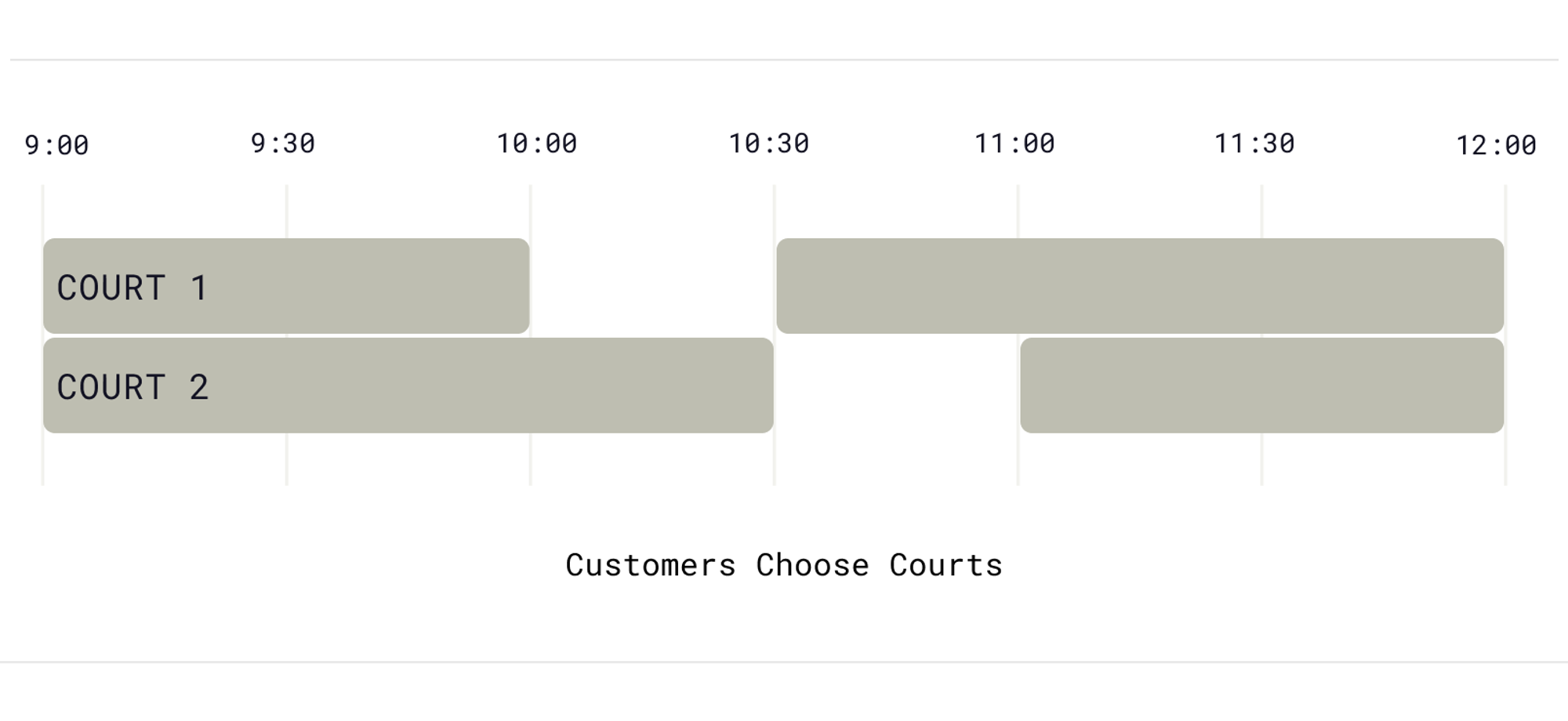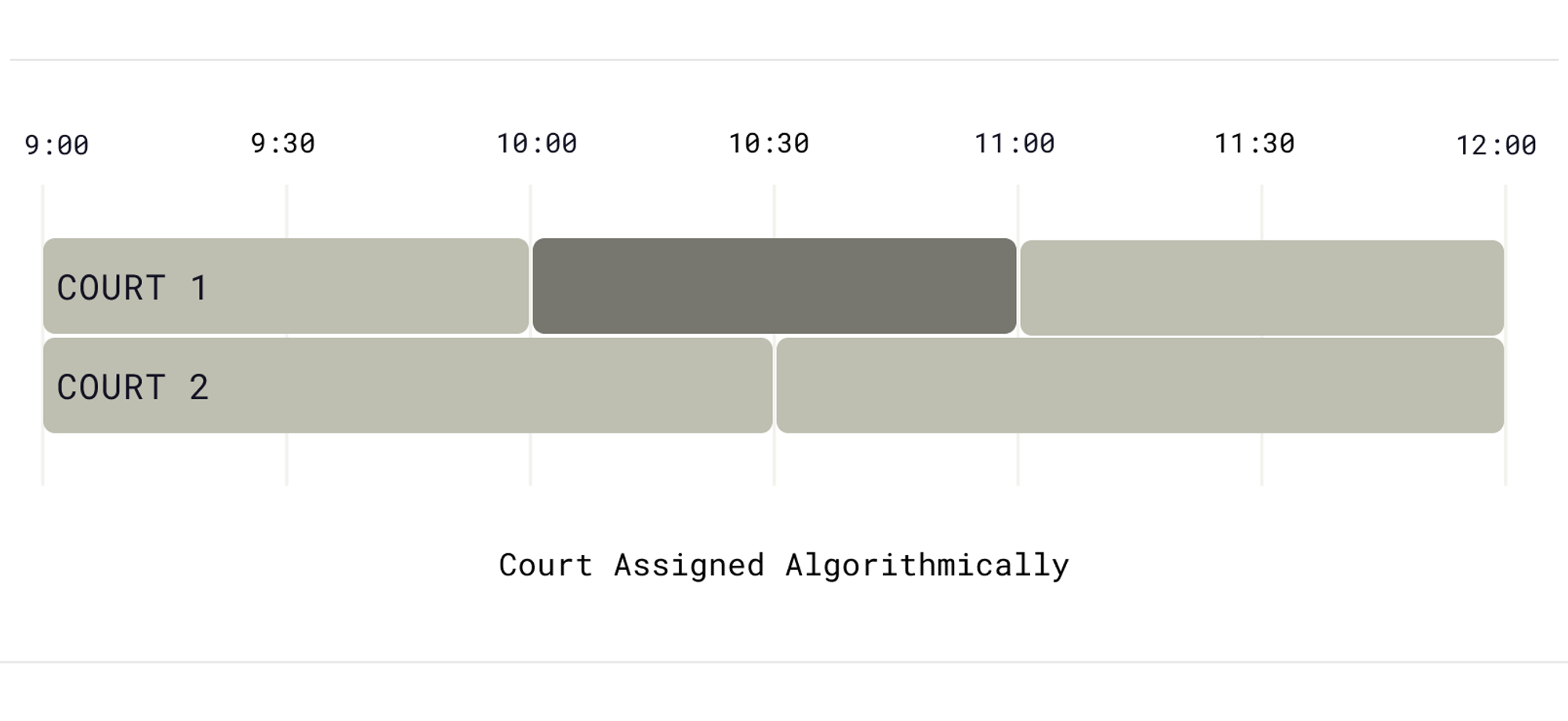The PodPlay Advantage, Managing Time-Bound Inventory
Very few racket sports clubs would say they are in the business of managing inventory, which sounds boring, like stocking shelves. It is much more exciting to focus on loftier goals like creating an amazing playing environment, elevating the sport, and building a community. But, like it or not, clubs are managing an inventory of court time, and managing it efficiently directly contributes to both the bottom line and the club’s ability to deliver that top notch experience for customers.
Use it or Lose it
Inventory is a product available to meet customer demand. An “optimal” inventory level for a business balances supply and demand in a manner that leads to happy customers who can get what they want, when they need it. Efficiently managing inventory can make or break a business, but how to do so can differ dramatically based on the type of inventory. Software that is purpose-built for the nuances of a particular industry can dramatically improve efficiencies. At PodPlay, we build software for sports venues that sell time-slotted experiences (e.g. court time) to their customers.
The fundamental properties of different kinds of inventory dictate how best to manage it. Physical goods require managing a complex supply chain and storage and delivery of finished products with differing shelf lives. Time-slotted experiences like court time present different challenges. The fundamental property of court time is: use it or lose it. You don’t get a second chance to use Court 1 at 3:30 pm last Friday. This quality makes optimizing utilization of available inventory crucial to the success of businesses that sell time-slotted experiences.
At PodPlay, we call this time-bound inventory , and are hyper-focused on helping our customers maximize it. Unlike physical inventory, where storage allows availability to shift through time, managing time-bound inventory (such as courts, tables, or appointments) is about quantity available at a particular time.
Empty Slots Add Up
A common example of time-bound inventory is a restaurant reservation. When you make a reservation at a restaurant, you are generally given a time slot, but not a specific table. By placing you in a queue, rather than giving you a specific table, the restaurant seeks to improve its chances of filling all of its available tables. The difference between an additional seating and an empty table can be massive for a restaurant business in the long run. For a restaurant with an average check size of $100 that is open 350 days per year, a single additional empty table per day equates to $35,000 in lost revenue per year.
The empty slot math is similar for racket sports venues. For a ten-court venue that sells court time for $50 per hour, filling an additional hour per day per court equates to $175,000 in additional revenue over 350 days. Missing out on one $50 booking may not sound like much, but when multiplied across 10 courts, 7 days a week, 52 weeks a year, it might make or break a business.
The ability to efficiently manage time-bound inventory can be the difference between a good and a great business. But, doing so at the expense of customer experience can have negative long-term consequences. Who hasn’t been to a restaurant that overbooked at your reservation time and made you sit at the bar for an hour to wait for a table? Having this experience might cause a customer to walk out, or think twice about returning to the restaurant.
The best systems for managing reservations optimize utilization, but not at the expense of the customer experience. The PodPlay admin dashboard and reservation algorithm are powerful tools that help racket sports venues maximize the value generated from their time-bound inventory while simultaneously delighting their customers.
Mind the Gap Please
The PodPlay admin dashboard looks like a game of Tetris. Blocks of time are color-coded based on the type of user (e.g. member, first-time customer, repeat customer, event, class, etc.). What any venue wants to avoid are gaps - the white, unused spaces - between bookings.
Systems that rely on customers to pick their own courts will be prone to more gaps. Take the example below. If a new customer wants to play from 10:00 to 11:00, the only way they can do so would be by making separate 30-minute bookings on Court 1 and Court 2, and switching courts in the middle of their booking.
This is a horrible customer experience on two fronts - the customer must do twice the work to make the booking and interrupt their game to switch courts - which will result in the customer not booking (and thereby contributing to unwanted gaps) or having a lousy experience. As a consequence, many booking systems would show no availability for this 1 hour slot.
Algorithmic Court Assignment
The optimal way to manage this inventory is to update court assignments algorithmically as new reservations are made. By moving the 1.5 hour block to Court 2 and the 1 hour block to Court 1, the algorithm can offer the new customer a full hour of court time without the customer needing to switch courts. The algorithm can also be configured to take into account other variables like giving members preference over non-members, or filling the most visible courts first.
Algorithmic court assignment can have a large impact on revenue generated. In this example, the venue operator has a total inventory of 6 hours of court time (2 Courts x 3 hours). At $50 an hour, the yield is $250 if the operator lets customers choose their own courts, and $300 if the courts are assigned algorithmically - a 20% increase in revenue for the venue operator. And as a bonus, the PodPlay algorithm also reduces friction for the customer at the time of booking and when they arrive at your venue.
If a venue offers some courts that are preferable to others, our system allows for customers to effectively “lock” a court in. A venue can opt to charge a premium for customers who choose to lock-in a court.
The PodPlay Advantage
Algorithmic court assignment is one of several killer features of the PodPlay SaaS offering, which will be the subject of future blog posts. PodPlay gives venue operators all the tools they need to digitally manage a physical space - integrating video replays, automated scoreboards, and autonomous functionality with a reservation engine, event management, coach connect, and payments.
Originally built to power PingPod, the network of futuristic autonomous ping pong clubs, PodPlay is being used today to manage venues across pickleball, padel, ping pong, and pool, with more sports to come in the future.
If you’re interested in learning more about managing time-bound inventory with PodPlay’s reservation management system, head over to our website and request a demo.
*Originally published by Ben Borton, Oct 2nd, 2023. The article is on PodPlay's blog.


